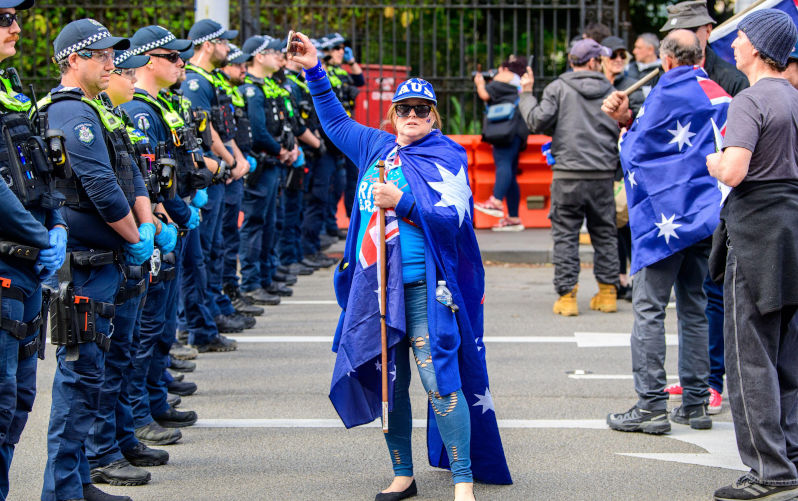Australia’s fragile multicultural consensus under threat
November 7, 2025
_Anti-immigration rallies_ around Australia in late August and mid-October exposed public divides over migration, social cohesion and national identity.
The rise of anti-immigration sentiment underscores a fragile consensus – while multiculturalism remains official government policy, its meaning and legitimacy are increasingly contested.
Public reactions to the protests were sharply divided. Some argued that the protesters voiced legitimate concerns about the cost of living, housing affordability and growing pressures on infrastructure and resources, while others contended that the rallies played into the racist agendas of white supremacists and neo-Nazis.
In contrast to divided public opinion, political leaders’ views appear less polarised. The centre-left Labor Party Government has adopted a defensive stance. Social Services Minister Tanya Plibersek responded to claims that migration was “out of control” by noting that Labor had already reduced the intake. Within the conservative opposition Liberal Party, some members of Parliament have quietly drifted towards positions historically associated with the far right, while former Australian prime minister Tony Abbott has openly opposed a more “ diverse” immigration program. Support for the anti-immigration One Nation Party has risen significantly, with the latest Resolve poll showing its primary vote reached 12%, higher than the Greens at 11%.
These developments are part of the growing wave of anti-immigration sentiment in many Western democracies. But in Australia, they expose a deeper fault line over multiculturalism. They also raise serious questions about whether Australia’s long-standing goal of social cohesion can still be achieved.
Since the abolition of the White Australia policy in the 1970s, Australian leaders have framed multiculturalism in shifting but broadly consistent terms — reflecting changing political priorities. Under the Whitlam and Fraser Governments, multiculturalism replaced the policy of assimilation, stressing cultural diversity and migrant rights. The Hawke and Keating Governments reaffirmed multiculturalism, but increasingly linked it to social cohesion, national identity and economic productivity, in an era of globalisation and Asia engagement.
Former Australian prime minister John Howard confessed he “always had trouble” with multiculturalism, arguing that new migrants should adopt “Australian values”. While in office, former Liberal prime minister Malcolm Turnbull released a multiculturalism statement that affirmed cultural diversity while stressing the need for integration. Turnbull’s Liberal successor as prime minister, Scott Morrison, then recast multiculturalism around national security, border control and unity. His emphasis was on cohesion and security, with cultural diversity presented as a managed outcome of these policies.
Incumbent Prime Minister Anthony Albanese has said that multiculturalism must be nurtured and valued, while also calling for social cohesion. After winning the 2022 election, his Labor Government conducted a Multicultural Framework Review, which found that the Australian Government viewed multicultural communities more as groups to be managed, not genuinely supported. At the state level, Victoria’s Multicultural Review urged the state to commit to a “long-term strategy – rather than reactive, piecemeal measures” to maintain an inclusive society. Endorsing Victoria’s review, sociologist Andrew Jakubowicz urges the state government to “own” these policies and integrate policy and practice under the guidance of a commission.
Despite diverging rhetoric, successive governments have maintained the core infrastructure of multicultural policy – including settlement services, English-language programs, anti-discrimination law and migrant resource centres. Scholars highlight the gap between rhetoric and action, arguing that racism, exclusion and power imbalances have seldom been addressed.
In June 2025, the Albanese Government announced the establishment of an Office for Multicultural Affairs within the Department of Home Affairs and elevated the standalone position of multicultural affairs minister to Cabinet for the first time. Multicultural Affairs Minister Anne Aly has attempted to reframe the debate around social cohesion, claiming that “making multicultural communities solely and wholly responsible for social cohesion… has added to that perception of multicultural communities being over-securitised, being responsible for things like social cohesion”.
Social cohesion has meant different things to different governments. Initially framed as a positive goal in the late 1990s and early 2000s, it aimed to support cultural diversity while encouraging belonging and participation. But scholars argue it soon became a political tool for disciplining difference. Some commentators even question the concept’s usefulness.
From the Howard era onward, social cohesion was invoked to justify a retreat from state-sponsored multiculturalism, reframing integration around “shared values” and responsibilities rather than rights. Following the 2001 Tampa crisis and 9/11, social cohesion became entangled with counter-terrorism policy, with Muslim communities identified as requiring integration. Under successive Coalition Governments, the concept was increasingly securitised, linked to citizenship testing, border control and the idea that diversity must not threaten stability.
Aly’s reconceptualisation of social cohesion represents a step forward. She acknowledges that cohesion issues are often caused by dominant institutions and broader society, not multicultural communities. What the government now needs are concrete measures to capture the experiences of multicultural communities and ensure that institutions protect citizens against racism, xenophobia and hate speech. This remains an urgent and unfinished task.
As Jakubowicz observes, Australia is a country with a racist past, striving not to have a racist future. In 2024, the National Anti-Racism Framework proposed reforms across Australia’s legal, justice, health, education, media and arts sectors to eliminate racism. But the government has not yet indicated how it will respond to the 63 recommendations. Though Labor is likely to remain in government for at least one more term, it is still struggling to move beyond rhetoric and appears far from having a coherent strategy to counter the surge of the far-right.
Republished from East Asia Forum, 30 October 2025
The views expressed in this article may or may not reflect those of Pearls and Irritations.


